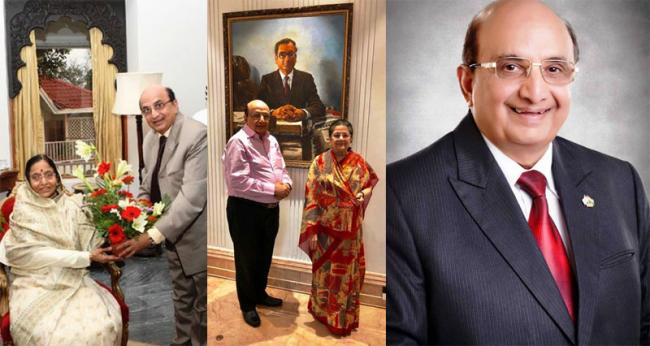
'Rotary clubs in India play a key role in helping the government to eradicate polio in the country'
It is the will to do good to others that is the driving force behind Rotary's service, says philanthropist and social activist Ashok Mulkraj Mahajan in conversation with Subhojit Roy
Why is Rotary International important in the global perspective? What has been its contribution to promote global peace?
A government's role to undertake various humanitarian projects is limited by various factors. Finance is a small portion of that since governments can raise resources by various methods. The important limiting factor seems to be the expertise in delivering the programmes to the people. Of course, the government machinery is vast with highly educated people, but we have seen that the quality of service they have offered while delivering the programmes of the government has been shoddy.
Take healthcare for example. The major disease which affected children ​was polio and except in certain advanced nations, the polio eradication programme did not yield the desired results within the expected time frame. That was when the help of Rotary International was taken by governments world wide. Volunteers took up the mobilisation and vaccination task as a personal challenge. The results are there to see today with nearly 99 percent of the world polio free.
In India, especially, the programme faced roadblocks from the Muslim community who saw the vaccine as a grave threat to their future generations. What the government could not do, a group of Rotarians did by forming the Ulema Committee which spread the correct message about polio eradication and India became polio free.
Rotary has understood that to promote world peace, the majority of the communities must have some of the basic needs, such as health, education and food, met. Rotary clubs worldwide have identified pockets of people where the aid from the government could not reach on time and have restored the people's basic faith in peace. It is the various programmes of Rotary that have ensured peace in many countries and in addition the qualified Rotary peace scholars aid in settlement of disputes in many countries. The role of NGOs and service organisations such as Rotary have become central to the functioning of any democratic country today.
How active is Rotary in India and what are the areas it works in?
Rotary came to India in 1920. The first club was in Calcutta. Today, there is hardly any district in India which does not have a Rotary club. With over 3,700 Rotary clubs in India and with a membership of over 140,000, there is no dearth of activity for Rotary in India. Today, India has 4 Rotary zones with two Directors elected to the Board of Rotary International from India.
Apart from the massive polio eradication programme which was successfully launched in 1985 by Rotary, the Government of India formally launched the National Immunisation Drive in 1995 along with Rotary whose volunteers spread across the country took the vaccines to nearly all households.
The projects in which Rotary clubs work in India include maternal and child welfare, education, supply of clean water, and vocational guidance. In some states, Rotary clubs have also built check dams for providing water to the villages. Many hospitals in remote areas have received gifts of latest medical equipment thanks to​ the matching grants projects which were undertaken by Rotary with clubs abroad. Children in schools and colleges are trained through the Interact and Rotaract programmes of Rotary to become responsible adults who can lead the community towards prosperity.
Define the present scenario of Polio worldwide and how effective are we in India to prevent recurrence?
Today polio is prevalent only in Pakistan and Afghanistan. Only 11 cases have been reported this year from these two countries, three from Pakistan and eight from Afghanistan. Though Nigeria is also classified as polio endemic country, fortunately no cases have been reported there this year. Rotary International has spent over US $1.7 billion worldwide till date for the polio eradication programme.
Though India is now declared polio free, the surveillance and National Immunisation Days are still being followed with renewed vigour. This is why we are able to keep a close watch on areas which were susceptible to the virus in India. With proper education and persuasion about hygiene and diet, the children are being safeguarded against the virus. Rotary knows that polio anywhere is a danger everywhere and cross-border transmission of the virus is monitored vigorously. At the Pakistan borders, we have established polio booth wherein every child entering India gets Polio drops
Is Rotary an elite organization working for the poor or an organization by the people for the people and of the people? This is in context of several misgivings in general public about the organization.
Rotary is a service organisation with members from various strata of society. It is not an elite organisation and has never been. The misgivings largely rose from seeing the members discuss about social welfare measures from the comfort of their plush offices or over lunch or dinner in a big hotel.
Rotarians have to pay a fee to become members of this organisation and they are people who are professionals in their chosen area of work.
The public have been fed imaginary ideas of service activities and think that doing good to others can be done only when you sport the look of the people you want to help.
Philanthropists are wealthy people and they have a life-style in which they decide to live with their own money. It is such people who have been giving millions of dollars for welfare schemes and they decide about how much to give and how to deliver the service from an atmosphere which allows them to take measured decisions. Talks for peace during war time are held within the confines of the walls of the offices of the leaders of the warring nations and not on the battlefield.
Similarly, you can take decisions that promotes the well-being of people from an atmosphere that is conducive to the decision makers. This is not to say that the wealthy people alone can be members.
Today, we have Rotary clubs in nearly all towns where the ordinary trader and shop owner is also a member. They join voluntarily and give their time and talent to the community. The several misgivings, as you have put it, are just misgivings which arise from the fact that those who raise such doubts have neither the will nor the ability to be a part of a force that was formed to do good.
(Ashok Mulkraj Mahajan (born: July 23, 1947) passed his B.E. (Electrical) from Bombay University securing a merit position. He obtained distinction in Diploma in Operation Management and Diploma in Business Management from Bombay University. In 1973, he became a senior partner in Raj Industries, but he felt something missing. It was at this juncture that he came across Rotary club, Mulund and became a member of the same. He became the President of the Club and served RI as Dist. Governor (93-94) of Dist. 3140. He has been serving the club since 1973 and has risen from an ordinary member to the coveted position of R.I. Director (2007-2009) and Trustee of The Rotary Foundation (2009-13). One of his key activities have been facilitating Rajshree Birla's contribution towards The Rotary Foundation to the tune of US$ 7.2 million to eradicate polio from the world. He played an important role in convincing religious heads of a minority community to speak about polio vaccination during prayer congregation in UP; the message later on spread to other states of India helping in the process of making India polio free.)
Support Our Journalism
We cannot do without you.. your contribution supports unbiased journalism
IBNS is not driven by any ism- not wokeism, not racism, not skewed secularism, not hyper right-wing or left liberal ideals, nor by any hardline religious beliefs or hyper nationalism. We want to serve you good old objective news, as they are. We do not judge or preach. We let people decide for themselves. We only try to present factual and well-sourced news.







